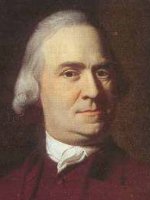A Momentous Day for Samuel Adams
A couple of days ago, I listed Boston’s three representatives to the Massachusetts General Court as of 25 Sept 1765.
Under the pre-Revolutionary Massachusetts constitution, Boston could elect four representatives. (That still left its population underrepresented compared to the much smaller rural towns.) But one of the men Bostonians had elected in May, the young attorney Oxenbridge Thacher, had died unexpectedly on 9 July.
On the morning of 27 September, therefore, Boston had a special election in Faneuil Hall to fill Thacher’s seat. The town records say that the meeting began with a prayer by the Rev. Samuel Checkley. The selectmen then asked for all white male Bostonians who met the higher property requirements for a General Court election to vote by noon.
The selectmen then organized a second round of voting. That time Adams received 265 votes out of 448 and “was duly Elected.”
Thus, four days after Adams had drafted Boston’s special instructions to its legislative representatives, he became one of those representatives. He made the short walk over to the Town House where the General Court was meeting and was sworn in that afternoon.
Whereupon Gov. Francis Bernard announced that sadly this legislative session was conflicting with important court dates and keeping some gentlemen away, so he had no choice but to adjourn the Massachusetts General Court until 23 October. That would be after the Stamp Act Congress in New York, and only about a week before the Stamp Act was supposed to take effect.
Thus ended Samuel Adams’s first day as a Massachusetts legislator.
Under the pre-Revolutionary Massachusetts constitution, Boston could elect four representatives. (That still left its population underrepresented compared to the much smaller rural towns.) But one of the men Bostonians had elected in May, the young attorney Oxenbridge Thacher, had died unexpectedly on 9 July.
On the morning of 27 September, therefore, Boston had a special election in Faneuil Hall to fill Thacher’s seat. The town records say that the meeting began with a prayer by the Rev. Samuel Checkley. The selectmen then asked for all white male Bostonians who met the higher property requirements for a General Court election to vote by noon.
the Inhabitants withdrew & brought in their Votes for a Representative, and upon counting and sorting them it appeared that the number of Votes were 572 of whichNote that Adams did not yet have the wealth to be accorded the honorific “Esq.” Nor did he have a mathematical majority, though he had a clear plurality.
- John Ruddock Esq. had 110 –
- John Rowe Esq. 137 –
- John Hancock Esq. 40 – and
- Mr. Samuel Adams 247 –
The selectmen then organized a second round of voting. That time Adams received 265 votes out of 448 and “was duly Elected.”
Thus, four days after Adams had drafted Boston’s special instructions to its legislative representatives, he became one of those representatives. He made the short walk over to the Town House where the General Court was meeting and was sworn in that afternoon.
Whereupon Gov. Francis Bernard announced that sadly this legislative session was conflicting with important court dates and keeping some gentlemen away, so he had no choice but to adjourn the Massachusetts General Court until 23 October. That would be after the Stamp Act Congress in New York, and only about a week before the Stamp Act was supposed to take effect.
Thus ended Samuel Adams’s first day as a Massachusetts legislator.


No comments:
Post a Comment